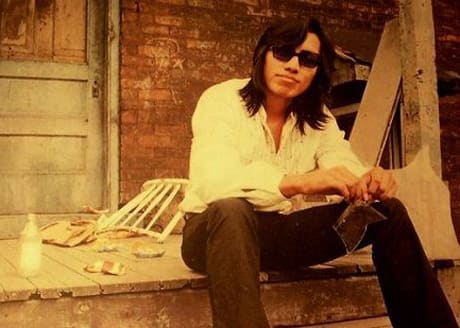One foggy night on the east side of Detroit in 1968, two music producers entered a smoky bar to check out an unknown singer-songwriter named Rodriguez. Hunched over his guitar on stage, with his back to the crowd, his soulful guitar riffs and philosophical lyrics filled the room, capturing the attention of all. The producers believed they discovered the next Bob Dylan and immediately signed him to their label, producing two albums. Sadly, both records flop in his native America and Rodriguez fades into virtual obscurity.
Through an incredible twist of fate, a bootleg copy of his first album made its way to apartheid-era South Africa and caught on like wildfire. Young white liberals latched onto his music and it became the voice of the anti-apartheid rebellion. Rodriguez became bigger than the Beatles or Elvis in South Africa, yet no one had any clue who this man was beyond the cover art of the album.
Worst of all, due to poor management by the record label, Rodriguez never learned of being revered as a rock god on the other side of the world. Rumours circulated that he killed himself on stage, either by setting himself on fire or by putting a bullet in his head.
Fast-forward to present day and a select few in South Africa want to track down Rodriguez and find out the story behind the epic album. Malik Bendjelloul's Searching for Sugar Man plays out like a mystery thriller as he tracks down Rodriguez, following the money trail, or lack thereof, back to a Motown music executive that collected the royalties, but evades questions about how the funds were dispersed.
Infused with the music of Rodriguez and archival photographs, juxtaposed with talking head interviews from professional collaborators, a portrait is painted of the mystery man leading up to an impressive twist sure to leave viewers astonished.
Fortunately, Bendjelloul stops short of creating a hagiographic music documentary, leaving us to feel as though we've been introduced to musical greatness by way of an inspiring celebration of the human spirit and an unjustly forgotten talent.
(Mongrel Media)Through an incredible twist of fate, a bootleg copy of his first album made its way to apartheid-era South Africa and caught on like wildfire. Young white liberals latched onto his music and it became the voice of the anti-apartheid rebellion. Rodriguez became bigger than the Beatles or Elvis in South Africa, yet no one had any clue who this man was beyond the cover art of the album.
Worst of all, due to poor management by the record label, Rodriguez never learned of being revered as a rock god on the other side of the world. Rumours circulated that he killed himself on stage, either by setting himself on fire or by putting a bullet in his head.
Fast-forward to present day and a select few in South Africa want to track down Rodriguez and find out the story behind the epic album. Malik Bendjelloul's Searching for Sugar Man plays out like a mystery thriller as he tracks down Rodriguez, following the money trail, or lack thereof, back to a Motown music executive that collected the royalties, but evades questions about how the funds were dispersed.
Infused with the music of Rodriguez and archival photographs, juxtaposed with talking head interviews from professional collaborators, a portrait is painted of the mystery man leading up to an impressive twist sure to leave viewers astonished.
Fortunately, Bendjelloul stops short of creating a hagiographic music documentary, leaving us to feel as though we've been introduced to musical greatness by way of an inspiring celebration of the human spirit and an unjustly forgotten talent.
